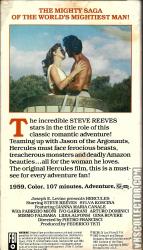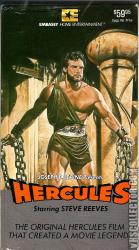Hercules
Catalog Number
2073
-
Primary Distributor (If not listed, select "OTHER")
Catalog Number
2073
Primary Distributor (If not listed, select "OTHER")
Release Year
Country
N/A (NTSC)
N/A | N/A | N/A
N/A | N/A
Hercules (1959)
Additional Information
Additional Information
Spectacles of Massive Might Beyond Any Ever Known Before!
SEE the War of the Chariots! SEE Lydia, the Temptress! SEE the Contest of Giants! SEE the Combat of Kings! SEE the Arena of Tigers! SEE the Court of Lovers!
The Heroic Legend of Hercules Continues!
Stronger Than Ever Before!
See the mammoth war of the chariots!
The mighty saga of the world's mightiest man!
Fabulous feats of human power the screen has never shown before!
Heralding a decade of Italian-made sword-and-sandal films, Hercules -- as it's been known in the United States since its 1959 release -- draws most of its plot from the legend of Jason and the Golden Fleece. Hercules, the half-immortal son of Jupiter (or Zeus) rescues Iole, the daughter of Pelias, the king of Jolco, when the horses pulling her chariot run wild. Returning her to the court, he is engaged by Pelias to train his vain, arrogant son in the use of arms, that he may one day become a warrior king. Pelias' hold on power is very uncertain, owing to the way he became king -- his brother, the previous monarch, was murdered by persons unknown in the palace -- and he looks to leave a dynasty. The prince is later killed through his own foolishness, however, and the blame falls on Hercules. In order to win back the grieving heart of Iole, Hercules surrenders his immortality and manages to triumph in a savage test of his strength against the Cretan Bull. One day, a stranger arrives in Jolco claiming to be Jason, Pelias' nephew, and son of the murdered king -- and the rightful king. To prove his claim, he vows to sail to the ends of the Earth and reclaim the Golden Fleece, the symbol of rightful rule in Jolco, which was stolen on the night that his father was murdered. A crew is assembled that includes various legendary figures out of Greek mythology, with Hercules at the head of the list. They survive encounters with sea storms and a predatory race of women, the machinations of a traitor in their ranks, and Pelias' treachery, and Jason slays the dragon guarding the Golden Fleece. On their return, however, the Fleece is stolen and Hercules is imprisoned. Jason and his men are surrounded by Pelias' soldiers and a battle ensues. Iole frees Hercules, who comes to the aid of Jason and restores him to the throne that's rightfully his. This battle features one of the best action sequences in the film as Hercules, his wrists still in the shackles and chains that bound him in Pelias' dungeon, first kills the man who murdered the old king and then, faced with mounted cavalry charging him on the steps of the palace, pulls down the pillars supporting the facade and wipes out the cavalry. Pelias, unable to contain his own guilt, commits suicide and Iole, seeing the truth about her father, goes to Hercules and accepts him as her husband. Ray Harryhausen's Jason and the Argonauts, made six years later, told the same story with far superior effects and a less conclusive ending, but Hercules is a fun movie in its own right, and Steve Reeves cuts a stunning figure, even if his voice is dubbed. Curiously, there are two different dubbed versions of Hercules in circulation, one of which (the one that was on television in the early '60s, and was on the VidAmerica videocassette) features a simpler range of English dialogue that works better. The other version occasionally uses more florrid language (and appeared on the Image Entertainment letterboxed laserdisc), which doesn't really resonate well. The giveaway comes in the scene where Hercules prays to Jupiter at the temple, surrendering his powers. The simpler, better track has the echoed voice come back "the Cretan Bull awaits."
Le fatiche di Ercole (English: The labours of Hercules; English title: Hercules) is a 1957 Italian epic fantasy feature film (released in Italy in 1958) based upon the Hercules myths and the Quest for the Golden Fleece. The film stars Steve Reeves as the titular hero and Sylva Koscina as his love interest Princess Iole. Hercules was directed by Pietro Francisci and produced by Federico Teti. The film spawned a sequel, Hercules Unchained (Italian: Ercole e la Regina di Lidia), that also starred Reeves and Koscina.
Hercules made Reeves an international film star and effectively paved the way for the dozens of 1960s sword and sandal flicks featuring oiled bodybuilders as mythological heroes and gladiators battling monsters, despots, and evil queens. The film's Italian title means "The Labors of Hercules".
American producer Joseph E. Levine acquired the U.S. distribution rights to the film, and, due in part to his wide release (the film opened in 175 theaters in the New York City area alone) a long with an intensive promotional campaign, Hercules became a major box-office hit
Release Date: July 22, 1959
Distrib: Warner Brothers
SEE the War of the Chariots! SEE Lydia, the Temptress! SEE the Contest of Giants! SEE the Combat of Kings! SEE the Arena of Tigers! SEE the Court of Lovers!
The Heroic Legend of Hercules Continues!
Stronger Than Ever Before!
See the mammoth war of the chariots!
The mighty saga of the world's mightiest man!
Fabulous feats of human power the screen has never shown before!
Heralding a decade of Italian-made sword-and-sandal films, Hercules -- as it's been known in the United States since its 1959 release -- draws most of its plot from the legend of Jason and the Golden Fleece. Hercules, the half-immortal son of Jupiter (or Zeus) rescues Iole, the daughter of Pelias, the king of Jolco, when the horses pulling her chariot run wild. Returning her to the court, he is engaged by Pelias to train his vain, arrogant son in the use of arms, that he may one day become a warrior king. Pelias' hold on power is very uncertain, owing to the way he became king -- his brother, the previous monarch, was murdered by persons unknown in the palace -- and he looks to leave a dynasty. The prince is later killed through his own foolishness, however, and the blame falls on Hercules. In order to win back the grieving heart of Iole, Hercules surrenders his immortality and manages to triumph in a savage test of his strength against the Cretan Bull. One day, a stranger arrives in Jolco claiming to be Jason, Pelias' nephew, and son of the murdered king -- and the rightful king. To prove his claim, he vows to sail to the ends of the Earth and reclaim the Golden Fleece, the symbol of rightful rule in Jolco, which was stolen on the night that his father was murdered. A crew is assembled that includes various legendary figures out of Greek mythology, with Hercules at the head of the list. They survive encounters with sea storms and a predatory race of women, the machinations of a traitor in their ranks, and Pelias' treachery, and Jason slays the dragon guarding the Golden Fleece. On their return, however, the Fleece is stolen and Hercules is imprisoned. Jason and his men are surrounded by Pelias' soldiers and a battle ensues. Iole frees Hercules, who comes to the aid of Jason and restores him to the throne that's rightfully his. This battle features one of the best action sequences in the film as Hercules, his wrists still in the shackles and chains that bound him in Pelias' dungeon, first kills the man who murdered the old king and then, faced with mounted cavalry charging him on the steps of the palace, pulls down the pillars supporting the facade and wipes out the cavalry. Pelias, unable to contain his own guilt, commits suicide and Iole, seeing the truth about her father, goes to Hercules and accepts him as her husband. Ray Harryhausen's Jason and the Argonauts, made six years later, told the same story with far superior effects and a less conclusive ending, but Hercules is a fun movie in its own right, and Steve Reeves cuts a stunning figure, even if his voice is dubbed. Curiously, there are two different dubbed versions of Hercules in circulation, one of which (the one that was on television in the early '60s, and was on the VidAmerica videocassette) features a simpler range of English dialogue that works better. The other version occasionally uses more florrid language (and appeared on the Image Entertainment letterboxed laserdisc), which doesn't really resonate well. The giveaway comes in the scene where Hercules prays to Jupiter at the temple, surrendering his powers. The simpler, better track has the echoed voice come back "the Cretan Bull awaits."
Le fatiche di Ercole (English: The labours of Hercules; English title: Hercules) is a 1957 Italian epic fantasy feature film (released in Italy in 1958) based upon the Hercules myths and the Quest for the Golden Fleece. The film stars Steve Reeves as the titular hero and Sylva Koscina as his love interest Princess Iole. Hercules was directed by Pietro Francisci and produced by Federico Teti. The film spawned a sequel, Hercules Unchained (Italian: Ercole e la Regina di Lidia), that also starred Reeves and Koscina.
Hercules made Reeves an international film star and effectively paved the way for the dozens of 1960s sword and sandal flicks featuring oiled bodybuilders as mythological heroes and gladiators battling monsters, despots, and evil queens. The film's Italian title means "The Labors of Hercules".
American producer Joseph E. Levine acquired the U.S. distribution rights to the film, and, due in part to his wide release (the film opened in 175 theaters in the New York City area alone) a long with an intensive promotional campaign, Hercules became a major box-office hit
Release Date: July 22, 1959
Distrib: Warner Brothers






Comments0
Login / Register to post comments